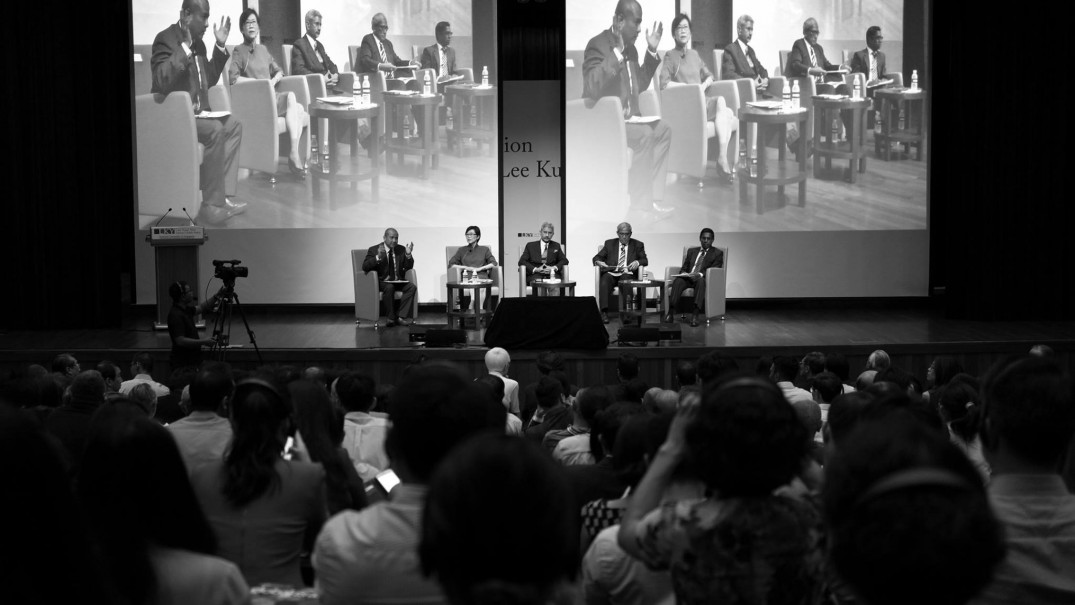
One year after Mr Lee Kuan Yew’s death, what will he be remembered for? The answer depends on who you ask.
But few would disagree that his zeal for learning was one of his most widely admired qualities. It was a trait greatly respected by those around him. And according to at least one recent survey, it was a virtue greatly missed by his people.
The question was posed at a recent panel discussion at the Lee Kuan Yew School of Public Policy, titled “The Enduring Ideas of Lee Kuan Yew”. Held on March 23, 2016 – a year to the day of Mr
Lee’s passing – the discussion was just one of many tributes offered that day to Singapore’s founding father.
Both The Straits Times and TODAY published letters and commentaries written by journalists and people who worked with him, including the former president, Mr SR Nathan, who described education as Mr Lee’s “preoccupation to uplift the nation”.
From the panel discussion to these articles, that was a thread that ran through all that was said and written about him on his anniversary: education and his passion for learning.
In a survey commissioned earlier this year by TODAY and conducted by Blackbox, a research consultancy, three-quarters of 500 respondents polled said that Mr Lee’s wisdom was a quality that Singapore’s leaders should possess. His wisdom also came in first
in a ranking of what the respondents thought Singapore had lost when he died.
This wisdom did not come just from learning – but from learning constantly, and often from people with whom he disagreed.
One of the panel’s discussants at the LKY School, community leader Zainul Abidin, recalled the difficult decision Mr Lee took to close down Nanyang University in the late 1970s – despite many including himself disagreeing with Mr Lee. Later, the Government
changed its mind and converted Nanyang University to Nanyang Technological Institute and, eventually, to Nanyang Technological University.
“Many people think of him as an autocrat, but he always listened to the people around him,” said Mr Abidin, who is the former Senior Minister of State (Foreign Affairs).
Another panel member, Mr Shashi Jayakumar, spoke of Mr Lee in the 1980s, when he brought in new talent to be “constructive critics” due to a lack of opposition members in Parliament.
“He wanted the new leadership to be microscopically tested out… He wanted these backbenchers to act as a ‘counterfoil’ to Members of Parliament,” said Mr Shashi, who is Senior Fellow and Head of the S. Rajaratnam School of International Studies’ Centre
of Excellence for National Security.
“If you have an interesting view, he will always make time for you,” he added.
But perhaps the most revealing insights during the discussion came from Professor Chan Heng Chee, who described Mr Lee as “always asking questions, always learning”. She called him Singapore’s “Chief Gardener”, a visionary who believed in caring for the
environment before it was fashionable to do so.
“He didn’t care about being politically correct. He wanted only to be correct,” said Prof Chan, who is Chairman of the Lee Kuan Yew Centre for Innovative Cities at the Singapore University of Technology and Design.
Several more stories about Mr Lee’s passion for learning were shared in the media on the day of his first-year anniversary. Mr Ng Chee Meng, Acting Minister for Education (Schools) and Senior Minister of State, Ministry of Transport, recalled a meeting
with Mr Lee in 2010 at the Singapore Air Show.
He was then the Chief of Air Force and Mr Lee was Minister Mentor. In an interview with TODAY, he said he was struck by Mr Lee’s curiosity and inquisitiveness about the operational details of the air force. “His core principle remains that Singapore needs
a strong defence, but (Mr Lee) attempts to keep (himself) updated – from the changing context of technology to (military) relationships, to help him understand how to do things right,” Mr Ng told the newspaper.
In The Straits Times, Minister of State (Ministry of Communications and Information & Ministry of Health) Chee Hong Tat spoke about Mr Lee’s wisdom in balancing Chinese and American politics, when he was working with him as his Principal Private Secretary.
He said: “Mr Lee was neither a China dove nor a China hawk. He was more like a wise owl who understood the motivations and thinking of both Chinese and Western leaders.”
But perhaps it was Ms Chua Mui Hoong, the paper’s Opinion Editor, who put it best, in describing Mr Lee’s unmistakable passion – and pragmatism – in learning.
In looking towards the years ahead without Mr Lee, she wrote: “New circumstances call for fresh thinking and bold answers to both novel challenges and even recurring questions. Just as Mr Lee was never wedded to an idea or ideology, he would surely not
want his solutions to the problems of his times codified into a system of thought to be unthinkingly applied to a different era.”
Times have changed, and so too will the questions the Republic now faces. What Mr Lee has left behind – this legacy of learning – is perhaps just what will bring the nation to the answers it needs.
This article is written as an opinion piece for the panel discussion on “The Enduring Ideas of Lee Kuan Yew” which took place at the Lee Kuan Yew School of Public Policy on 23 March 2016. The video coverage of the event can be found in YouTube.
This article is written as an opinion piece for the panel discussion on "The Enduring Ideas of Lee Kuan Yew" which took place at the Lee Kuan Yew School of Public Policy on 23 March 2016. The video coverage of the event can be found in YouTube.